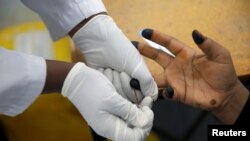The 22nd International Conference on AIDS and STIs in Africa, or ICASA, is being held under the theme "AIDS IS NOT OVER: Address inequalities, accelerate inclusion and innovation."
Local organizer and head of the Zimbabwe's National Aids Council Dr. Bernard Madzima says the six-day conference will be about sharing experiences and best practices in the fight against AIDS and sexually transmitted infections.
"The conference is looking at the issues of leadership in the HIV sector, it's looking the scientific evidence which should lead programs and we are also going to be having exhibitions," Madzima told VOA.
"We are also going to showcase work which Zimbabwe has done in the HIV sector and the progress we have made. As you are aware Zimbabwe is one of the few countries who have attained the 95-95-95 targets of 2025," he added.
The United Nations’ AIDS program, UNAIDS, set the 95-95-95 targets which include diagnosing 95% of all HIV infections, treating 95% of those diagnosed with antiretroviral drugs and achieving viral suppression in 95% of those receiving treatment.
According to UNAIDS Botswana, Eswatini, Rwanda and Tanzania have also attained the 95-95-95 targets.
Sixteen other countries, eight of them in sub-Saharan Africa, the region which accounts for 65% of all people living with HIV, are also close to attaining the targets, UNAIDS says.
The ICASA conference seeks to mainstream equity, inclusion and diversity in controlling the impact of diseases, increase domestic funding and community response, respond to HIV/AIDS, tuberculosis and other emerging diseases and generate evidence-based data for policy formation.
The conference is taking place as Harare and other parts of Zimbabwe are recording increasing cholera cases. Late in November, Zimbabwe declared a state of emergency in the capital, and started restricting public gatherings and food vending after cases of the disease spiked.
Minister of Health Dr. Douglas Mombeshora told journalists the cases were not a cause for concern regarding the conference preparations.
"We have managed to adequately deal with the isolated outbreaks of cholera that were reported some months ago," Mombeshora said. "Let me emphasize that our surveillance system is effective."
Madzima said the conference will be a mix of high-level meetings, side events and exhibitions.
Part of the high-level talks include a meeting convened by Zimbabwe’s first lady Auxillia Mnangagwa, who will host fellow first ladies in the resort town of Victoria Falls to discuss how they can further the fight against AIDS and STIs.





![HIV Challenges Worsened by Economic Crisis in South Sudan [4:29]](https://gdb.voanews.com/4fded0c4-43cd-4c9c-af3f-a45a87b9f097_w33_r1.jpg)




Forum